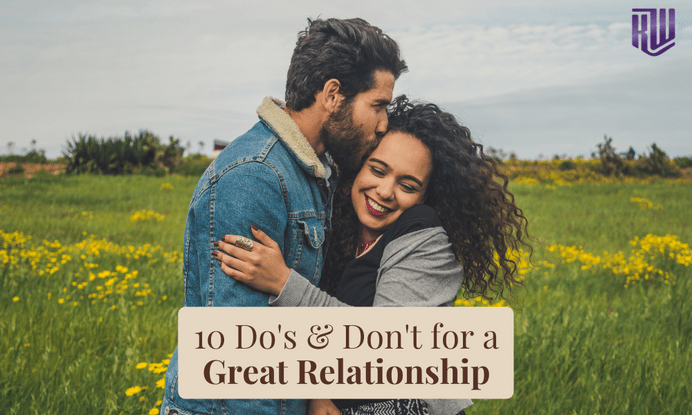Welcome back! Today I want to share the 10 Do’s and Don’ts to have a successful and loving relationship.
something we all want in our lives. I’ll give you 10 Do’s, 10 Don’ts, then break down what’s causing the 10 Don’ts. Unless we deal with the core problem, we won’t be able to stop the Don’ts!
Let’s get started with the Do’s – those in a great relationship have the following traits:
- They recognize it’s never their partner’s job to meet their needs and wants. It’s wonderful when they do.
- But they don’t expect it. They recognize it’s their own responsibility, so they put a plan in place to meet their needs and wants themselves.
- They don’t fear their partner will betray them. They aren’t snooping, controlling, or spying on their partner.
- They have general security that their partner is invested in them and cares about them.
- They see the world as basically decent – that people, in general, are decent.
- Sure, there are less-than-perfect people out there, but their general worldview is positive rather than negative.
- They see themselves as lovable and worthy of love. They recognize their great qualities and their perfect imperfections.
- They’re open to the possibility that someone else out there has the same feelings about themselves and is willing to accept those perfect imperfections.
Don’t allow harmful behaviors.
- They don’t make excuses for them, and they don’t condone them.
- They recognize harmful behaviors as intolerable. They say no to them immediately.
- They don’t abandon themselves to be loved. They don’t give up their friends, family, hobby, or career to be loved.
- They keep attached to what matters to them, and if someone asks them to give those up, they won’t. That makes them available for a healthy relationship.
- They know their morals, values, needs, wants, negotiable’s, and non-negotiable’s.
- They know how to communicate with them openly. They aren’t afraid to ask their partner for help, and they don’t expect their partner to read their mind. They constantly communicate from this place of inherent worth.
- They believe in setting boundaries and that saying no is loving. They don’t see this as cold or problematic.
- Saying no means love because it removes the possibility of saying yes to things expecting something in return which is manipulative.
See that boundaries create safety and love.
- They never enable, rescue, or play the parent with their partner. They know their partner will struggle, and they have faith that they’ll figure it out.
- They don’t try to gain false power or esteem over their partner by fixing it for them.
- Instead, they pick partners who can do it on their own.
- They embrace the fact that relationships are difficult. They don’t pull away or run away or quit.
- Instead, they stay engaged and recognize the difficulties are what create long-lasting intimacy and connection.
- They’ll use difficulties to learn about each other and gain deeper trust and understanding in each other.
That is the foundation for people in healthy relationships. This is what they believe about themselves, and they always go back to that base. This is where they originate relationships.
Don’ts
Now let’s get into the Don’ts – the polar opposite of the Dos. You see these in almost every movie or TV show. What we’ve had modeled for us is very unhealthy.
These things are not OK in a relationship. If you find yourself on this list, that doesn’t mean you’re a bad person.
Don’t beat yourself up – you can’t be blamed for doing things you were taught to do. If this is the first time you hear these, that means this is the first day you have a choice.
You can choose to learn new information to gain the knowledge, skills, and tools to have the relationship you deserve – that’s what matters.
Own the past but don’t blame yourself. You can sit down with your partner and use this as a springboard to strengthen your relationship.
- They believe the partner should meet their needs and wants at all times. Even worse, that their partner should know what they are and that they never have to request them to be met.
- In almost every relationship, clients tell me they’ve told their partner what they want a thousand times, that they should know. I remind them that while that would be ideal.
- it’s important to you but maybe not to them. That doesn’t make them bad people. It’s not their job – their life is filled with their own needs and wants.
- Our partners are human, so yes, they’re going to forget. In a poor relationship, there is this constant demand that our partner is focused on us at all times.
- That belief is codependent, manipulative, destructive, and unhealthy. It’s never our partner’s job to meet our needs and wants. It’s wonderful when they do, but if they don’t – it’s not about them, it’s about us.
- Instead, we will want to look at ourselves and ask why we picked a partner who doesn’t meet our needs and wants as much as we would like?
- No trust. We need to control, spy, and snoop. We constantly put the latches on our partners because of our own fears, insecurities, and abandonment issues.
A lack of trust in others is hiding a lack of trust in ourselves for our previous choices. That’s not about them, though they may have been perfectly imperfect.
- Ultimately it means we have a trust issue with ourselves.
- We then project our lack of trust in ourselves outward and might think everyone is inherently bad or deceptive – that everyone is a problem, everything is a danger.
- A basic belief that we’re unlovable or unworthy of love. This shows up in the first 2 traits. If we do the previous things, it’s because we think something’s defective in us.
- Instead of learning to love ourselves, we become controlling and hypervigilant to make sure the other person loves us.
- Oftentimes we are detached from these deeper feelings and don’t recognize our behaviors.
- Again, not because we are bad, but movies and TV have taught us always to play the victim and live in the fantasy that it is the other person’s job to adore us at all times.
- No one will love us unless we put up with this bad behavior. You may wonder why people stay in abusive relationships? I have a client who calls me every week, telling me she’s broken up with her boyfriend for the last time.
- The next session starts with how they got back together, and she laments about how he is still doing and saying hurtful things.
violence in the relationship
- The violence in the relationship only escalates, yet she keeps going back. The going back is a product of the lack of love for herself.
- Like so many others, she is minimizing the bad behaviors.
- A need for constant approval and affirmation. This shows up in the inability to take criticism or be wrong. It is a belief that our partner will constantly have to have our back in any disagreements.
- There is a demand for constant support. I call this the Kardashian model of love. They speak about this often. I use this very extreme example to show how absurd that belief is because it brings home the point.
- if we believe our partner is supposed to meet our needs constantly and support us, have our backs, never go against us. it opens a door.
- What if your partner came to you saying they’re bored in life, so to spice things up, they will become a serial killer.
- If we were always to support them and have their back.we would have to be OK with that! If you believe your partner needs to support you constantly, this is.
in essence, what you’re advocating for.
- Everyone is perfectly imperfect, and everyone has behaviors that shouldn’t be supported.
- It’s loving for a partner to confront and kindly show us we didn’t have a great moment.
- Sacrificing everything for the partner. You see this all the time – people giving up friends, hobbies, careers.
- I did this in my first marriage – in fact, I did everything on this list. I went about 10 years without seeing my family because it was what she wanted.
- All I knew were the messages from movies, media, and TV and if I loved her I had to sacrifice everything for her.
- We don’t know our morals, values, needs, wants, negotiable’s, and non-negotiable’s. Again, this was me in my first marriage.
- I remember laying on my bed as a kid, wondering who would marry me: if she’d be nice or pretty. I had no idea I could decide my morals, values, needs, wants, negotiable’s, and non-negotiable’s.
- I spent years waiting for someone to pick me up. It’s the biggest pitfall I see in relationships: we never sit down and ask ourselves these questions.
- Every area of my life didn’t line up with my first wife because I never sat down and mapped these things out – that’s on me. How could she meet my needs and wants if our morals and values were opposite?
- No boundaries and the inability to say no.
Why do relationships break up?
- You hear people exclaiming, I did this and that for the other person, and how the other person wouldn’t do something for them.
- That means we did all those things in the hopes of getting those things in return. That is manipulation. It shows we didn’t want to do them.
- They went against our morals and values. The proof is we are throwing it in their face, keeping score, and resenting them. That’s why “no” is the most loving word a partner can tell us.
- We inherently know they won’t throw it in our face or beat us up in the future. For instance, My first wife loved to go to garage sales, and I hated them.
- But, under the guidelines of self-sacrifice, I would go, spending hours in the car on the weekends. Then at night, I’d be passive-aggressive, make snotty comments, and take it out on her.
- Where is the love in that? If you hear yourself in this, don’t shame yourself.
Recognize you did the best you could, and you’re here, learning now
- Recognize you did the best you could, and you’re here, learning now. Commit to loving yourself, love your partner, by starting to say no.
- We feel a sense of recognition, power, and joy from rescuing, enabling, and saving our partners. This was me, again. My ex was a pill addict.
- I’d drive all across the state, going to her friends’ house, lying to pharmacies and doctors, trying to get more pills. I was totally enabling her addiction but thinking I was rescuing her from being hurt.
- I thought if I did this, maybe she’d have sex with me. It was all a manipulation. When people give themselves away to do for others, it’s a false power dynamic.
- They can harbor and sit in the resentment, never having to face their manipulation. I used to say I quit pro hockey, I gave up my family, I gave up sex, I changed careers, I changed my whole life for her:
- And she wouldn’t sleep with me. She wouldn’t stop hitting me. I’m not condoning any of her behaviors, but I was never taught about the Do’s, boundaries, or a healthy relationship: I was manipulative and responsible. We have to take ownership of our part to change it.
Relationships are avoided.
- These are the people that say, “Oh, I’m done with relationships! Men/women are all liars and cheaters.” If they are in a relationship, they won’t open up to their partner or be vulnerable.
- Instead, because of the lack of knowledge, skills, and tools, they stay stuck in their pain, avoid relationships and project the problem onto others.
Finally, we get down to what causes all of this: most people live in the Don’ts because of their poor attachment with their parents in childhood.
We want it to be about the partner, but even if they start doing everything we want, we have no shot if we don’t go back and heal our trauma.
The 10 Don’ts are false coping skills we developed because of our parents’ perfect imperfections and the false models we have seen on TV, in movies, and the media.
We adopted the Don’ts to survive.
This played out recently. I was on a podcast where the interviewer told me how she wanted to become a lawyer because it was her parent’s dream for her.
Luckily she realized it and stopped but her mom is still running her life, podcast, and business.
She’s still trying to please her parents. I found out later her mother was upset with me after I explained this to her – the mom didn’t want to take ownership of her perfect imperfections.
I find that so sad that parents have such a hard time owning their imperfections.
I know it’s uncomfortable to admit these things about our parents or as parents to admit them to ourselves, and I’m not always the best at communicating it, but I’m not trying to blame parents.
I do believe it is loving to hold them accountable but not blamed. My goal is to break the wall of denial down, and my heart is to do it lovingly.
Every scientific process out there shows all of our perfect imperfections are a result of our childhood.
If we’re not addressing childhood trauma, we’re not addressing the core problem.
I’ll leave you with this: if you decide to face the pain from the past, I have yet to see one person whose life didn’t explode with joy, peace, and contentment.
If that’s what you really want, this is the only way I have found that always works.
Please share your comments – I love seeing what you have to say. Please share this message with those who may need it – so we can all get the relationship and love we deserve.
Enjoy The Journey??

You Deserve to Have a Deeply Committed, Loving Relationship.
The five core elements of having your dreams’ a deeply committed, loving relationship free from codependence, are here waiting for you.
This class teaches you how to create deep emotional connections that bring you and your partner closer together than ever before. While also teaching you how to heal pain from the past, so your relationship is free from codependence.
First, we remove the intensity and fear of commitment by building intimacy, love, support, understanding, and appreciation. mutual respect instead of disconnection or distance between each other.
Then learn a simple, straightforward process to apologize and forgive your partner. So that they can feel safe again in their relationship with you. Finally, it’s time for something new! A better life awaits if only we take action now!
We have everything you need right here at our fingertips.
All it takes is just one click! So join us today and start your journey towards creating more meaningful relationships through learning how to fight fair together as partners in crime who will always be there when needed most!
This is not about being perfect but rather about being real. which means taking responsibility when things go wrong without blaming or shaming each other to move forward together into a brighter future filled with happiness & joy!
Sign up today and create the lasting love and connection of your dreams!




